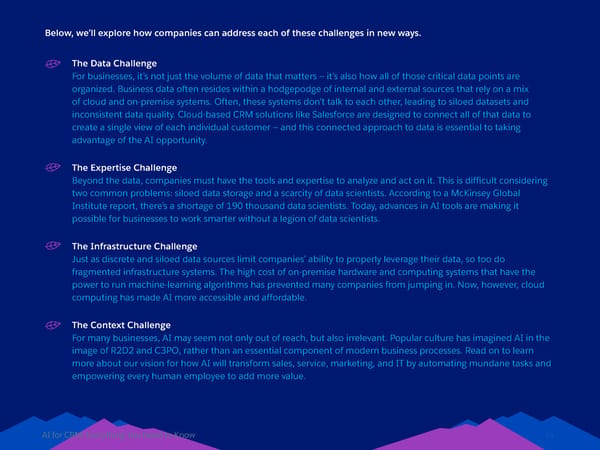Below, we’ll explore how companies can address each of these challenges in new ways. The Data Challenge For businesses, it’s not just the volume of data that matters — it’s also how all of those critical data points are organized. Business data often resides within a hodgepodge of internal and external sources that rely on a mix of cloud and on-premise systems. Often, these systems don’t talk to each other, leading to siloed datasets and inconsistent data quality. Cloud-based CRM solutions like Salesforce are designed to connect all of that data to create a single view of each individual customer — and this connected approach to data is essential to taking advantage of the AI opportunity. The Expertise Challenge Beyond the data, companies must have the tools and expertise to analyze and act on it. This is difficult considering two common problems: siloed data storage and a scarcity of data scientists. According to a McKinsey Global Institute report, there’s a shortage of 190 thousand data scientists. Today, advances in AI tools are making it possible for businesses to work smarter without a legion of data scientists. The Infrastructure Challenge Just as discrete and siloed data sources limit companies’ ability to properly leverage their data, so too do fragmented infrastructure systems. The high cost of on-premise hardware and computing systems that have the power to run machine-learning algorithms has prevented many companies from jumping in. Now, however, cloud computing has made AI more accessible and affordable. The Context Challenge For many businesses, AI may seem not only out of reach, but also irrelevant. Popular culture has imagined AI in the image of R2D2 and C3PO, rather than an essential component of modern business processes. Read on to learn more about our vision for how AI will transform sales, service, marketing, and IT by automating mundane tasks and empowering every human employee to add more value. AI for CRM: Everything You Need to Know 14
 AI for CRM Page 13 Page 15
AI for CRM Page 13 Page 15